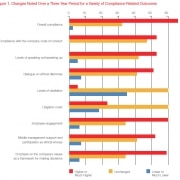Week That Was in Ethical Systems, 1/20-1/26
The authors discuss their recent NBER working paper, in which they find that “high levels of perceived integrity are positively correlated with good outcomes, in terms of higher productivity, profitability, better industrial relations, and higher level of attractiveness to prospective job applicants.” They also note that “a focus towards shareholders value maximization undermines the ability of a company to sustain a high level of integrity capital,” which is concordant with research aggregated here at Ethical Systems. In the future we intend to add pages relevant to corporate culture and governance, but for now we refer you to our discussion of how good ethics is good business.
SEC Investigating Whistleblower Retaliation Claims, in The Wall Street Journal
Securities and Exchange Commission whistleblower chief Sean McKessy intends to enforce Dodd-Frank’s anti-retaliation provisions against noncompliant employers using cease-and-desist orders and monetary sanctions. While discouraging whistleblower retaliation is important, we would also like to see measures aimed at incentivizing companies to foster an atmosphere of trust and transparency, which will encourage people who see unethical behavior to speak up. Please see our page on Whistleblowing for further information.
How Asian Management Culture Affects Risk, in The Wall Street Journal
More than two dozen South Korean executives have offered to resign in the wake of a data breach exposing the information of over 100 million cardholders. This stands in stark contrast to the recent Target Corp. breach and highlights certain differences between eastern and western cultures that may lead to different outcomes in business ethics. Check out the linked article for more details, and please see our page on Leadership.
Accounting Firm Leaders and Staff See Ethics Differently, in Accounting Today
Research into the ethics of accounting firms has determined that “while most accounting professionals perceive the ethical environment of their firm as quite strong, the partners, principals and directors of the firm perceive the ethical environment as even stronger than the other staffers.” In a recent study (to be published in the Journal of Business Ethics), the authors “found that when non-leader accounting professionals believe they participate in shaping and maintaining the ethical environment and/or have a strong organizational fit with the accounting firm, they are more likely to view the ethical environment as strong and to view it similarly to firm leaders.” We agree that it is essential for employees to feel a sense of agency and inclusion in the ethical culture of their organization. However, we caution that biases can lead individuals to believe that they and their teammates are more ethical than they actually are. Please see our pages on Leadership and Accounting for more information.



